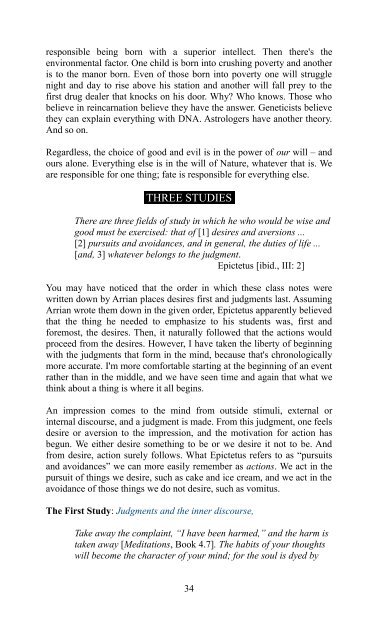The Stoic HANDBOOK - College of Stoic Philosophers
The Stoic HANDBOOK - College of Stoic Philosophers
The Stoic HANDBOOK - College of Stoic Philosophers
Create successful ePaper yourself
Turn your PDF publications into a flip-book with our unique Google optimized e-Paper software.
esponsible being born with a superior intellect. <strong>The</strong>n there's the<br />
environmental factor. One child is born into crushing poverty and another<br />
is to the manor born. Even <strong>of</strong> those born into poverty one will struggle<br />
night and day to rise above his station and another will fall prey to the<br />
first drug dealer that knocks on his door. Why? Who knows. Those who<br />
believe in reincarnation believe they have the answer. Geneticists believe<br />
they can explain everything with DNA. Astrologers have another theory.<br />
And so on.<br />
Regardless, the choice <strong>of</strong> good and evil is in the power <strong>of</strong> our will – and<br />
ours alone. Everything else is in the will <strong>of</strong> Nature, whatever that is. We<br />
are responsible for one thing; fate is responsible for everything else.<br />
THREE STUDIES<br />
<strong>The</strong>re are three fields <strong>of</strong> study in which he who would be wise and<br />
good must be exercised: that <strong>of</strong> [1] desires and aversions ...<br />
[2] pursuits and avoidances, and in general, the duties <strong>of</strong> life ...<br />
[and, 3] whatever belongs to the judgment.<br />
Epictetus [ibid., III: 2]<br />
You may have noticed that the order in which these class notes were<br />
written down by Arrian places desires first and judgments last. Assuming<br />
Arrian wrote them down in the given order, Epictetus apparently believed<br />
that the thing he needed to emphasize to his students was, first and<br />
foremost, the desires. <strong>The</strong>n, it naturally followed that the actions would<br />
proceed from the desires. However, I have taken the liberty <strong>of</strong> beginning<br />
with the judgments that form in the mind, because that's chronologically<br />
more accurate. I'm more comfortable starting at the beginning <strong>of</strong> an event<br />
rather than in the middle, and we have seen time and again that what we<br />
think about a thing is where it all begins.<br />
An impression comes to the mind from outside stimuli, external or<br />
internal discourse, and a judgment is made. From this judgment, one feels<br />
desire or aversion to the impression, and the motivation for action has<br />
begun. We either desire something to be or we desire it not to be. And<br />
from desire, action surely follows. What Epictetus refers to as “pursuits<br />
and avoidances” we can more easily remember as actions. We act in the<br />
pursuit <strong>of</strong> things we desire, such as cake and ice cream, and we act in the<br />
avoidance <strong>of</strong> those things we do not desire, such as vomitus.<br />
<strong>The</strong> First Study: Judgments and the inner discourse,<br />
Take away the complaint, “I have been harmed,” and the harm is<br />
taken away [Meditations, Book 4.7]. <strong>The</strong> habits <strong>of</strong> your thoughts<br />
will become the character <strong>of</strong> your mind; for the soul is dyed by<br />
34

















